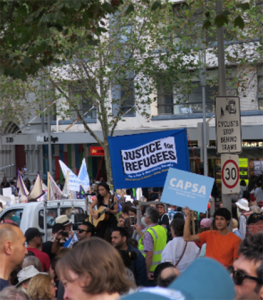COVID hits asylum seekers harder – survey
Asylum seekers faced considerable financial hardship and high levels of homelessness during the first twelve months of the pandemic, according to new research.
They were more likely than the general population to struggle to pay rent and bills, to find work and to be evicted from their homes during the pandemic, the study found.
 The survey, by Jesuit Refugee Service (JRS) Australia and Western Sydney University’s Translational Health Research Institute, asked over a hundred respondents seeking asylum living predominantly in West and Southwest Sydney, about their housing, homelessness, income, and employment experiences since arriving in Australia, and since pandemic restrictions first took effect in 2020.
The survey, by Jesuit Refugee Service (JRS) Australia and Western Sydney University’s Translational Health Research Institute, asked over a hundred respondents seeking asylum living predominantly in West and Southwest Sydney, about their housing, homelessness, income, and employment experiences since arriving in Australia, and since pandemic restrictions first took effect in 2020.
More than 55 per cent of respondents had experienced some form of homelessness since arriving in Australia. Nine per cent of respondents had slept rough, in a car, or in another improvised dwelling, and 14% had stayed in emergency accommodation since arrival.
Senior Research Fellow at Western Sydney University and co-author Dr Elizabeth Conroy said: “these findings highlight how much more prevalent experiences of homelessness are for people seeking asylum relative to the mainstream population”.
“They provide potential new insights into the hidden homelessness and destitution that people seeking asylum face and deserve further consideration in public policy,” she said.
The data also provided insights into how the COVID-19 pandemic has affected the financial circumstances and housing stability of people seeking asylum.
Despite a moratorium on evictions in 2020, 29 per cent of respondents were either evicted or moved from their accommodation because they were unable to pay rent.
This was in part because so many people seeking asylum are employed in cash-in-hand jobs, making it difficult for them to demonstrate loss of employment to landlords, the report said.
Approximately a third of respondents (36 per cent) reported having difficulty paying rent and a similar number (34 per cent) struggled to pay electricity/gas bills in the preceding twelve months.
And about 45 per cent of respondents reported they had run out of food in the previous three months.
“These findings show that significant numbers of people seeking asylum in Western Sydney were living in situations of poverty and homelessness even before this latest lockdown began. Our experience shows that struggles to put food on the table, pay rent, and buy medication have intensified in the last month,” the report said.
“Lockdown or not, there is an urgent need for the Federal Government to provide all people seeking safety in Australia with access to ongoing income support if they are unable to find safe and sustainable employment,” it said.
Read the report here: https://aus.jrs.net/wp-content/uploads/sites/20/2021/08/A-Place-to-Call-Home-Survey-Findings.pdf












